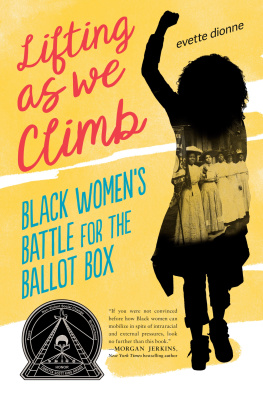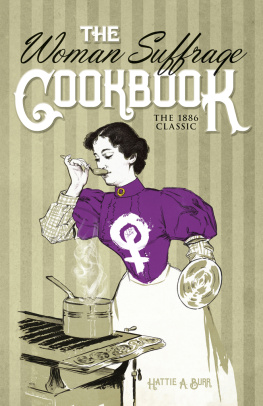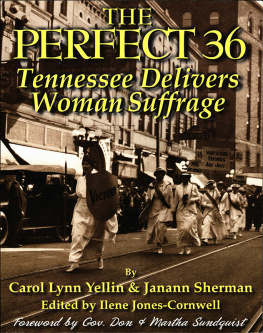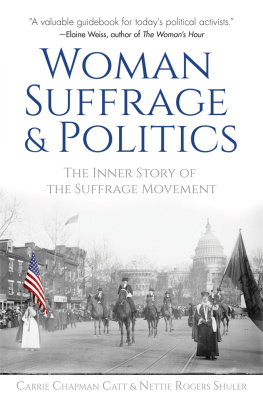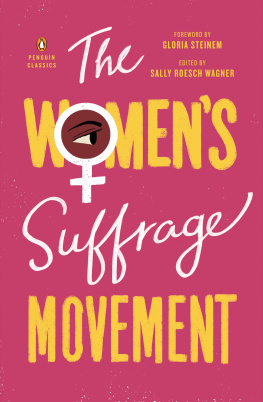Woman Suffrage & Citizenship in the Midwest, 18701920
IOWA AND THE MIDWEST EXPERIENCE
Series editor, William B. Friedricks,
Iowa History Center at Simpson College
Woman Suffrage & Citizenship in the Midwest, 18701920

SARA EGGE
University of Iowa Press, Iowa City
University of Iowa Press, Iowa City 52242
Copyright 2018 by the University of Iowa Press
www.uipress.uiowa.edu
Printed in the United States of America
Text design by Judy Gilats, Peregrine Graphics Services
No part of this book may be reproduced or used in any form or by any means without permission in writing from the publisher. All reasonable steps have been taken to contact copyright holders of material used in this book. The publisher would be pleased to make suitable arrangements with any whom it has not been possible to reach.
The University of Iowa Press is a member of Green Press Initiative and is committed to preserving natural resources.
Printed on acid-free paper
Cataloging-in Publication data is on file at the Library of Congress.
ISBN 978-1-60938-557-6 (pbk)
ISBN 978-1-60938-558-3 (ebk)
To Mark
Contents
Acknowledgments
DURING THE YEARS I have worked on this project, I have accrued many debts. My interest in woman suffrage in the Midwest began as an undergraduate at North Dakota State University and was fostered by a pair of scholars unmatched in their dedication to students. I thank David Danbom and Claire Strom for cheering me on all those years ago. David also read the manuscript in its entirety, and I thank him for his valuable suggestions. While a graduate student at Iowa State University, I received excellent advice from my mentor, Pamela Riney-Kehrberg. She supported me even when my plans were sketchy at best, and I am grateful for all that she has done for me. My thanks to her for reading the manuscript and offering well-timed feedback. I also appreciate the contributions of the members of my graduate committee, as well as the camaraderie and collegiality of my graduate school cohort at Iowa State. Jenny Barker-Devine has remained a steadfast supporter and friend, and I thank her for her prescient comments on the manuscript. Dorothy Schwieder and Deborah Fink listened carefully as I explained my vision for the project during its early stages, and their advice was unparalleled. My colleagues at Centre College have sustained my intellectual development, and I am a better teacher and scholar because of them.
In addition to the community of scholars who have supported this work, archivists across the country contributed their expertise to this project. At the New York Public Library and the Library of Congress, archivists uncovered important documents and correspondence. At the State Historical Society of Iowa, South Dakota State Historical Society, and Minnesota Historical Society, I benefited greatly from the dedicated staff members who work tirelessly to preserve state history. I especially thank Susan Jellinger and Mary Bennett in Iowa, Ken Stewart in South Dakota, and Debbie Miller in Minnesota. I am also grateful to the staff at the Iowa Womens Archives for their assistance. Jan Louwagie, the archivist at the Southwest Minnesota History Center in Marshall, provided kind and patient help and pointed out collections that I had overlooked. Staff members at the University of South Dakota were also incredibly supportive.
Local history is vital to this project, and I am grateful to the countless people in Clay County, Lyon County, and Yankton County who dedicate themselves to preserving the history of their communities. At the Clay County Heritage Center in Spencer, Cindy McGranahan and Holly Kellogg went above and beyond the call of duty. In one case, they contacted the Clay County Extension Office on my behalf so that I could track down a lead. In Lyon County, volunteers at the Lyon County Historical Society, as well as workers at the Minneota Public Library and Lyon County Public Library, dug up valuable documents I did not know existed. At the Dakota Territorial Museum in Yankton County, Crystal Nelson and her volunteer staff were exceptional resources. I also appreciated the impressive number of microfilm newspapers at the Yankton Public Library.
This book exists because of generous financial support. The U.S. Department of Education awarded me a Jacob K. Javits Fellowship that funded four years of graduate education. I thank Jennifer Rivera for her tireless efforts at managing the paperwork that the award required. I also received a research grant from the State Historical Society of Iowa, a professional development grant from Phi Alpha Theta, a travel grant from an anonymous donor to Iowa State Universitys History Department, and an Enduring Questions grant from the National Endowment for the Humanities to investigate citizenship. Centre College has provided annual faculty development funds to support the revisions to this project, and five students have served as summer research assistants: Sarah Welch, Ashton Spangler, Hadley Judson, Nicolaus Stengl, and Peter Shirley. I have tremendously enjoyed working with each one.
Family and friends have made the seemingly endless work on this project bearable. Research trips to South Dakota and Minnesota meant fun visits with Dana Suing, Ashli Maddox, and Jen and Tyler Everson. In New York, Laurie and Jose Vazquez offered me a warm bed and plenty of conversation, while Ben, Kelly, and Jayne McGovern were lovely hosts in Washington, DC. J. D. and Vercie Webb sustained me during long research days in Clay County with plenty of scrambled eggs and toast. I got to know them through my dear friends, Sam and Kimberly Isburg, with whom I spent many restful and relaxing weekends away. I thank my in-laws, Dorothea, Richard, and Paul, for their support, and I am sorry that Richard did not live to see the book. My parents, Alan and Sharon, and my siblings, Alison and Jon, taught me to appreciate my roots, and I owe them more than I can ever repay. I wrote drafts while thinking often of my grandmothers, Harriet Namminga and Dorothy Egge, who embody the strength of the midwestern women I study. Finally, I thank Mark for seeing me through this project. I look forward to many more years with him and our children.
Woman Suffrage & Citizenship in the Midwest, 18701920
Introduction
CITIZENSHIP, COMMUNITY, AND CIVIC RESPONSIBILITY IN THE MIDWEST
IN 1914 THE RESIDENTS of Yankton County, South Dakota, experienced their fifth campaign to enact a woman suffrage amendment to the states constitution. In the spring suffragists had formed the Yankton Universal Franchise League to promote the cause, and they relied on Edith Fitch, the district press chairman, to produce editorials for the campaign. By the fall, local newspapers were printing her articles, and she laid out a compelling claim to the ballot. Fitch argued that women deserved the right to vote because of their civic contributions to their communities. Midwestern women were at the forefront of community engagement, gaining public acclaim by raising the money needed to build churches, libraries, schools, parks, post offices, and other civic institutions. Fitch explained that the welfare of any community depends upon the amount of civic responsibility which its members assume. In the Midwest, Fitch claimed, women had fulfilled this civic responsibility with determination and grace. But even though women had proven their worth as citizens, they still could not vote. Instead, they foundered as half citizens with birthright citizenship but without political rights. Denying women the ballot was a major flaw in the promises of American citizenship. Our American republic rests on the broad principle that the people can be trusted, Fitch wrote, and that the fullest participation of its citizens in the government is the best safeguard of liberty. Womens civic contributions not only uplifted communities but also upheld foundational democratic principles. Unfortunately for the members of the Yankton Universal Franchise League, locals voted against the woman suffrage amendment, defeating it by almost a two-to-one margin.
Next page

